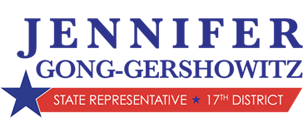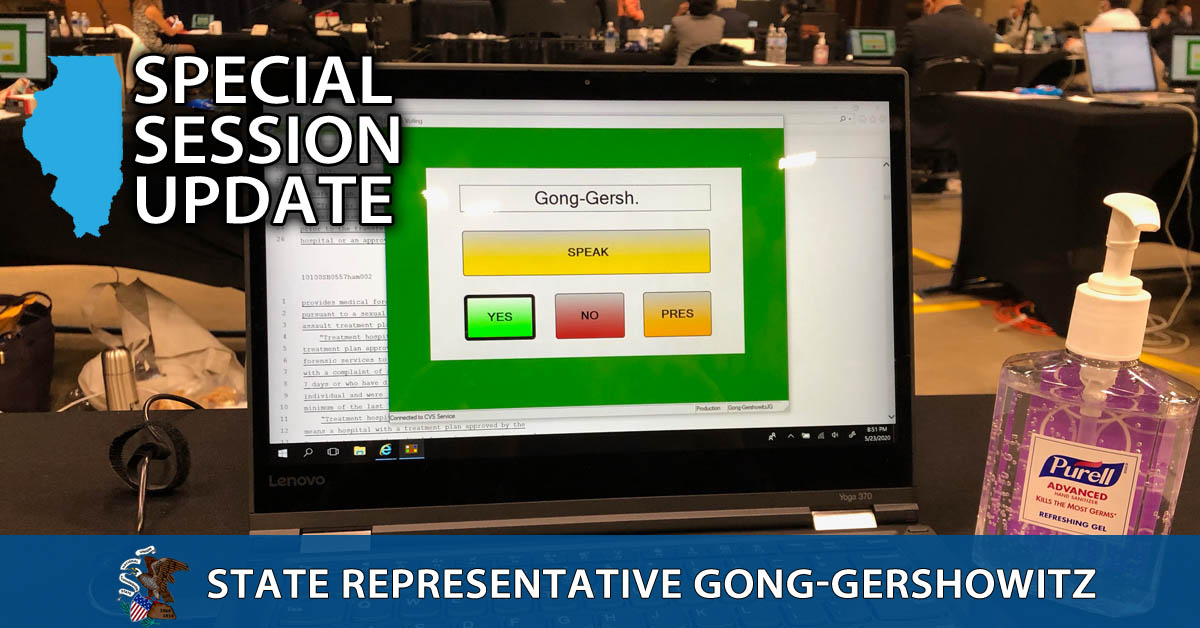
Dear Neighbors:
Thank you for your patience, your resilience, and your bravery in the face of this pandemic. As I have spoken to people across our district, I am inspired by the sense of community and togetherness that I have witnessed.
My colleagues and I returned to Springfield recently for a Special Session to address the impact of the COVID-19 pandemic in Illinois. My top priorities included supporting those battling the pandemic and providing essential services, bringing vital resources to those most impacted, and making difficult budgetary decisions to pass a responsible state budget.
As someone with close family members that are at high risk of COVID-19 complications, I was concerned about the health and safety implications of so many people in a single room. However, faced with a global pandemic, my responsibility to my constituents and to the frontline workers that risk their lives everyday necessitated that I be present in Springfield to address the most urgent needs of our communities. Unfortunately, many important pieces of legislation have been temporarily put on hold because of the pandemic, including legislation that I introduced this session to protect our environment, hold insurance companies accountable and crack down on abuses in the financial aid process for higher education.
I took every recommended public health precaution, but to protect my family, I am working in self-quarantine after returning from Springfield.
As workers and families across Illinois grapple with this pandemic and its economic fallout, we must work together as a community to support each other. Please contact my office if you have questions, concerns, or a need we can address. We are in this together.
Jennifer

Representative Jennifer Gong-Gershowitz
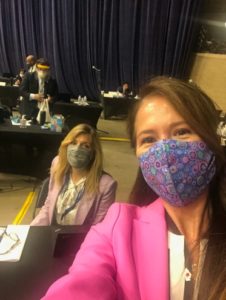
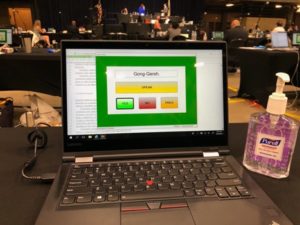
Images from the Session at the BOS Center in Springfield
Fiscal Year 21 State Budget
The economic downturn caused by COVID-19 has created a great deal of hardship to workers, small businesses, nonprofit organizations and the safety-net programs for our most vulnerable residents that rely on tax revenue generated by economic activity.
We were forced to make difficult financial decisions and our budget reflects this, with more than $1 billion in spending reduction from the budget Governor Pritzker introduced in February. Despite these cuts, this budget keeps level funding for schools and college financial aid while providing additional public health resources to combat the pandemic.
SB 264, approved by the legislature, appropriates federal funding from the Coronavirus Aid, Relief, and Economic Security (CARES) Act and protects vital education funding.
Major funding highlights include:
o $719 million in new funding for public health, including $416 million for COVID-19 testing and other services being performed by local health providers.
o Level funding for our schools and more than half a billion dollars for early childhood education.
o $43 million for career and technical education to help those whose careers have been wiped out by the pandemic.
o Level funding for college financial aid through MAP grants and AIM HIGH scholarships.
o Additional investment in senior care, including $58 million in new funding for in-home health care for older adults.
o Increased funding for homelessness prevention.
o Full funding for domestic violence shelters.
o Our fully obligated pension payments.
The full extent of this pandemic’s impact on our state finances is still being realized. This budget provides the Governor’s administration with increased flexibility to manage critical services while increasing legislative oversight of state spending. As part of this budget, the Governor will be required to provide consistent financial reports to the General Assembly to ensure the state is not spending beyond its means.
E-Learning/Graduation
As the mother of three children from middle school to college, I understand how difficult this process has been for so many students, including those planning to attend college as freshmen in the fall. Illinois schools and universities are grappling with a great deal of uncertainty during this pandemic and it has become vital for the state to provide leadership to protect our students’ education. Working in consultation with the State Board of Education, we approved SB 1569, which takes steps to help schools better accommodate remote learning and codify graduation requirements for this year.
Property Taxes
SB 685 works to provide support for homeowners by immediately suspending late payment penalties and tax sales and create immediate relief for homeowners who can now delay payments without penalty.
This pandemic poses particular challenges to older adults who are also required to regularly reapply for tax exemptions. This bill creates a one-year application deferral for seniors, veterans, and persons with disabilities. This will ensure homeowners can continue receiving these exemptions without going through an especially difficult reapplication process. While considerable work remains to be done to provide long-term property tax relief, these are stopgap measures designed to address short-term crises created by the pandemic.
Protections for Workers
Essential workers and first responders in our communities are facing serious risks to keep us safe and healthy, and keep pharmacies, grocery stores, gas stations and other critical services in operation.
SB 471 works to ease the process of receiving workers’ compensation benefits for police officers, fire fighters, EMTs, and workers at essential businesses who have been diagnosed with COVID-19. This legislation will help the tens of thousands of Illinois workers struggling with the economic effects of the virus by allowing laid off and furloughed workers to recoup a larger percentage of their previous income through unemployment.
2020 General Elections
The right to vote is a fundamental one and is essential to our democracy. Ensuring that voters can cast their ballots safely and ensure their voice is heard is a critical priority. As part of the Illinois House Democratic Women’s Caucus, I advanced a plan to expand Illinois’ absentee voting and dedicate Election Day 2020 as a State Holiday.
In an effort to increase the number of election judges across Illinois, this measure also lowers the minimum age of election judges to 16 and creates incentives for those receiving unemployment to serve as paid election judges.
This plan allows local election authorities to set up curb-side voting and implement drop boxes for ballot collection during expanded early voting times and on Election Day, with bipartisan election judges present to ensure election fidelity.
Beginning this summer, those who voted in the 2018 elections, 2019 consolidated election and 2019 primary, will receive a mail-in ballot request by mail, which they can return to receive a mail-in ballot for Election day.
Phase 3 – Guidelines for Business Reopenings
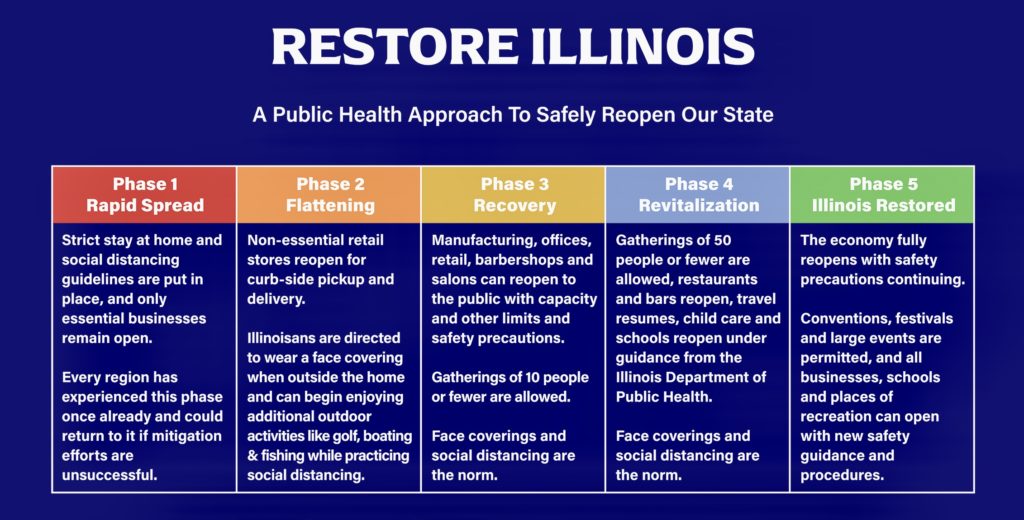 To help businesses and employees implement new safety guidelines and safely re-open, the State of Illinois has developed a business toolkit complete with signage, training checklists, and other resources to ensure business and activities are conducted in accordance with up-to-date public health recommendations.
To help businesses and employees implement new safety guidelines and safely re-open, the State of Illinois has developed a business toolkit complete with signage, training checklists, and other resources to ensure business and activities are conducted in accordance with up-to-date public health recommendations.
Phase 3 guidelines span 10 different industry categories. Each category includes a common set of guidelines that are expected and encouraged among all employers and activity types, as well as workplace and program-specific guidelines.
Common Guidelines for all Phase 3 Businesses and Operations to follow can be found in the Phase 3 Business Toolkit.
For direct support or questions, please contact the DCEO Business Hotline Monday through Friday at 1-800-252-2923, or email at: ceo.support@illinois.gov.
Given the anticipated movement of all four regions established under the Restore Illinois plan to Phase 3 later this week, I would like to express the importance of continuing to follow the IDPH guidelines: remaining home if sick, wearing a face covering when out in public, and maintaining social distancing – at least 6 feet apart.

